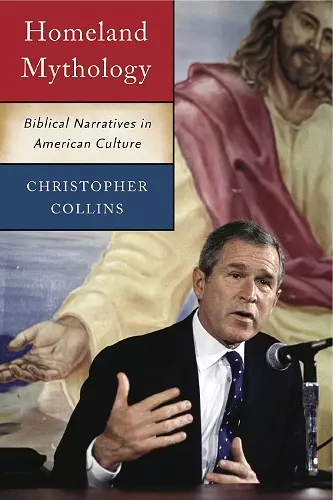Homeland Mythology
Biblical Narratives in American Culture
Format:Paperback
Publisher:Pennsylvania State University Press
Published:15th Feb '13
Currently unavailable, and unfortunately no date known when it will be back
This paperback is available in another edition too:
- Hardback£32.99(9780271029931)

Since 9/11, America has presented itself to the world as a Christianist culture, no less antimodern and nostalgic for an idealized past than its Islamist foes. The master-narrative both sides share might sound like this: Once upon a time, the values of the righteous community coincided with those of the state. Home and land were harmoniously united under God. But through intellectual pride (read: science) and disobedience (read: human rights), this God-blessed homeland was lost and is now worth every drop of blood it takes, ours and others’, to recover.
For Americans, the prime source for this once-and-future-kingdom myth is the Bible, with its many narratives of blessings gained, lost, and regained: the garden of Eden, the covenant with Abraham, the bondage in Egypt, the exodus under Moses, the glory of David and Solomon’s realm, the coming of the promised Messiah, his crucifixion, resurrection, and ascension into heaven, his apocalyptic return at the end of history, and his establishment of the earthly kingdom of God. As Homeland Mythology shows, these biblical narratives have, over time, inspired a multitude of nationalist narratives, myths ingeniously spun out to justify a number of decidedly unchristian policies and institutions—from Indian genocide, the slave trade, and the exploitation of immigrant workers to Manifest Destiny, imperial expansionism, and, most recently, preemptive war.
On March 25, 2001, George W. Bush shared a bit of political wisdom: “You can fool some of the people all of the time—and those are the ones you have to concentrate on.” The cynical use of religion to cloak criminal behavior is always worth exposing, but why our leaders lie to us is no longer a mystery. What does remain mysterious is why so many of us are disposed to believe their lies. The unexamined issue that this book addresses is, therefore, not the mendacity of the few, but the credulity of the many.
“For too long, scholars assumed that national policy could be understood in terms of rational choice economics and game theory. Fortunately, we are coming again to realize the power of stories in our national rhetoric. Homeland Mythology is a timely and engaging analysis of what it means for America to be our home. Christopher Collins has done us a great service in examining the roots of many of our unexamined national myths.”
—Robert Wuthnow, Princeton University, author of American Mythos: Why Our Best Efforts to Be a Better Nation Fall Short
“Collins addresses issues of considerable cultural resonance. By formulating these issues through the elements of myth, he promises to deepen greatly our understanding of the interplay between symbol and society. Because the subject crosses conventional divides, this work will be of interest to historians, literary and rhetorical critics, religious scholars, and students of culture generally.”
—Stephen H. Browne, Penn State University
“Much of what is covered [in this book] represents an important contribution to the fields of American studies and religious studies. It also represents a unique contribution in that it brings together important issues in ways that haven’t been synthesized before and traces back in history ideas that are very much the subject of discussion and debate among contemporary Americans.”
—Jacqueline Bacon, author of The Humblest May Stand Forth: Rhetoric, Empowerment, and Abolition (2002)
ISBN: 9780271058726
Dimensions: 229mm x 152mm x 20mm
Weight: 408g
288 pages